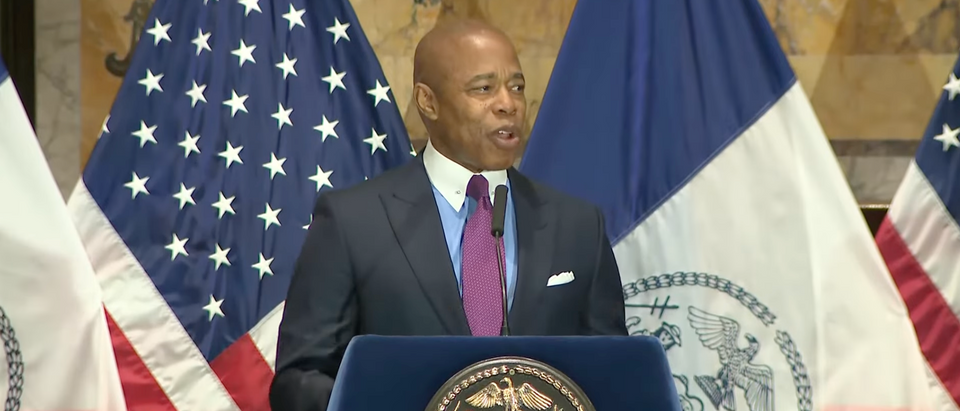The GOP is traditionally thought of as the party of faith, freedom and family, which is why it’s embarrassing when New York City’s Democratic Mayor Eric Adams has more of a spine than most Republican leaders.
Adams’ chief adviser Ingrid Lewis-Martin introduced the mayor Tuesday during an interfaith breakfast, saying the Adams administration “does not believe” it must “separate church from state.”
Adams doubled down on the idea, saying, “Don’t tell me about no separation of church and state. State is the body, church is the heart. You take the heart out of the body, the body dies. I can’t separate my belief because I’m an elected official.”
“When I walk, I walk with God. When I talk, I talk with God. When I put policies in place, I put them in with a God-like approach to them — that’s who I am,” he added, going on to attribute a spike in crime to a lack of faith.
Adams also said the next generation is being destroyed because they have not been instilled with “some level of faith and belief.”
He predictably drew rebuke from those on the left, who decried his comments as unconstitutional because of the alleged “separation of church and state.”
But that’s the thing: There is no such thing as a constitutionally mandated separation of church and state.
Jefferson wrote a letter in 1802, known as the “Danbury Baptist Letter,” in which he assured religious leaders the government would not encroach upon their religious liberties.
“Believing with you that religion is a matter which lies solely between Man & his God, that he owes account to none other for his faith or his worship, that the legitimate powers of government reach actions only, & not opinions, I contemplate with sovereign reverence that act of the whole American people which declared that their legislature should ‘make no law respecting an establishment of religion, or prohibiting the free exercise thereof,’ thus building a wall of separation between Church & State,” Jefferson wrote.
One cannot, in good faith, argue that Jefferson or any of the Founding Fathers wanted a Godless society or government. The founders never advocated for a theocracy but, conversely, never omitted their faith from their work.
Yet Democrats and Republicans have relied heavily on a few Supreme Court cases that cited Jefferson’s phraseology as irrefutable proof the founders intended some level of separation between church and state.
While there can be a separation of the state and the church as an institution, there shouldn’t be a separation between the state and God.
Washington invoked God during his inauguration speech when he quite literally said it would be wrong not to give praise to God.
“It would be peculiarly improper to omit in this first official Act, my fervent supplications to that Almighty Being who rules over the universe, who presides in the Councils of Nations, and whose providential aids can supply every human defect, that His benediction may consecrate to the liberties and happiness of the people of the United States,” Washington said.
He later invoked religion itself in his farewell address.
“Of all the dispositions and habits which lead to political prosperity, religion and morality are indispensable supports.”
Jefferson followed suit, saying in his second inaugural address: “I shall need, too, the favor of that Being in whose hands we are, who led our forefathers, as Israel of old, from their native land, and planted them in a country flowing with all the necessaries and comforts of life.”
The Treasury began printing “In God we trust” on coins beginning in 1865 after petitions from the public; the Supreme Court literally opens with a traditional cry that includes the phrase “God save the United States and this Honorable Court!”; all Senate sessions open with prayer; Truman designated a National Day of Prayer in 1952; our national anthem praises God … the list goes on and on.
For goodness sake, the very last line of the Declaration of Independence literally says the nation has a “firm reliance” on God.
“And for the support of this Declaration, with a firm reliance on the protection of divine Providence, we mutually pledge to each other our Lives, our Fortunes and our sacred Honor.”
So with God ever-present in the nation’s history, both socially and politically — what happened?
The Supreme Court decided in the 1962 case Engel v. Vitale that the state cannot hold prayer in public school, even if participation was not mandated or if the prayer was not affiliated with a particular religion. The high court ruled that holding official prayer violated the Establishment Clause of the First Amendment, relying on Jefferson’s “separation of Church and State” as justification to decide the public school breached the separation, since a school is a publicly funded government entity.
Justice Potter Stewart dissented, arguing the “Court has misapplied a great constitutional principle.”
“I cannot see how an ‘official religion’ is established by letting those who want to say a prayer say it,” he said. “On the contrary, I think that to deny the wish of these school children to join in reciting this prayer is to deny them the opportunity of sharing in the spiritual heritage of our Nation.”
Stewart was right.
In the opinion of the high court in Zorach v. Clauson, the justices wrote, “We are a religious people whose institutions presuppose a Supreme Being.”
If we are no longer one nation under God, we will be a nation gone under.
The views and opinions expressed in this commentary are those of the author and do not reflect the official position of the Daily Caller.












